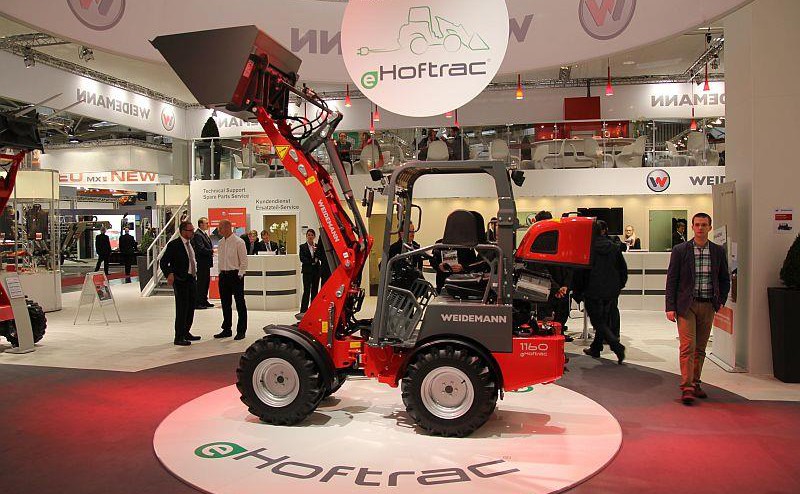
Weidemann has just released the first fully electric farm loader with articulated steering for agricultural interior applications. With this design and development, based on the classic 1160 Hoftrac®, Weidemann is taking a conscious step towards electro mobility on the farms of the agricultural and equine industry, and wants to keep actively expanding the innovative advantage that the Hoftrac® series have enforced over the years.
With the battery-operated loader, Weidemann wants to get rid of emissions in stables, improve the wellbeing of animals and create better working conditions. An additional effect is the reduction of noise pollution for neighbours in smaller locations.
The first eHoftrac is a 1160 Hoftrac. In previous years this model was sold in large quantities as an entry level model and is used in farms of all sizes. It therefore represents a rather large customer group.
First practical tests have clearly shown: The emission-free, low-noise eHoftrac considerably improves the living and working conditions of both man and animal in closed spaces; in comparison to a conventional machine, it does all this without loss in power and performance.
Farm loaders are used in stable work for several hours during the early morning and evening. One battery charge of an eHoftrac suffices for a work input of approximately 2-4 hours, depending on operational conditions. This is quite sufficient for machines in such a performance category. The charging time is max. 8 hours with a standard charger and only 6 hours with a quick charger.
This technology also seems to be very interesting for the thousands of machines used within closed areas, e.g. in the various livestock farms in the agricultural and equine industry, in the unloading of fruit and vegetables and in potato cultivation, as well as greenhouses. But it is also very interesting in small and medium industrial applications.
Particularly in an industrial environment, farm and wheel loaders, when compared to forklifts, have the advantage of running with equal stability both on paved surfaces and off-road. This means they are far more versatile than typical forklifts which are more geared to single operations within a building.
As an advantage for mobile machines, electrical engineering permits extremely dynamic and powerful startup. Due to the short tapping of high currents, electric engines are able to deliver high power and torque within a short period, even far in excess of their electrical load rating. The operator notices this benefit in the machine every time when accelerating. To design a machine that accommodates a price-sensitive market, the developers at Weidemann soon realised that lithium-ion battery technology was out of the question, due to the immense costs. Instead, they aligned the concept to systems that have been well established in the scope of forklifts. Therefore, a tried-and tested industrial lead-acid battery was used in the innovative, electric eHoftrac.
The service parameters of the eHoftrac ® are similar to those of the conventional, existing machine. The tipping load increases favourably, due to the weight of the battery in the machine, to 1,348 kg including bucket (machine straight). The eHoftrac® only requires a power connection with 400 volts, to be found on every farm. It is charged simply by flipping open the engine hood and connecting the battery to the battery charger. The appropriate plug receptacle is installed on the machine, which is protected against dust and splash-water.
The eHoftrac® – an innovation available on the Irish market from June 2015.